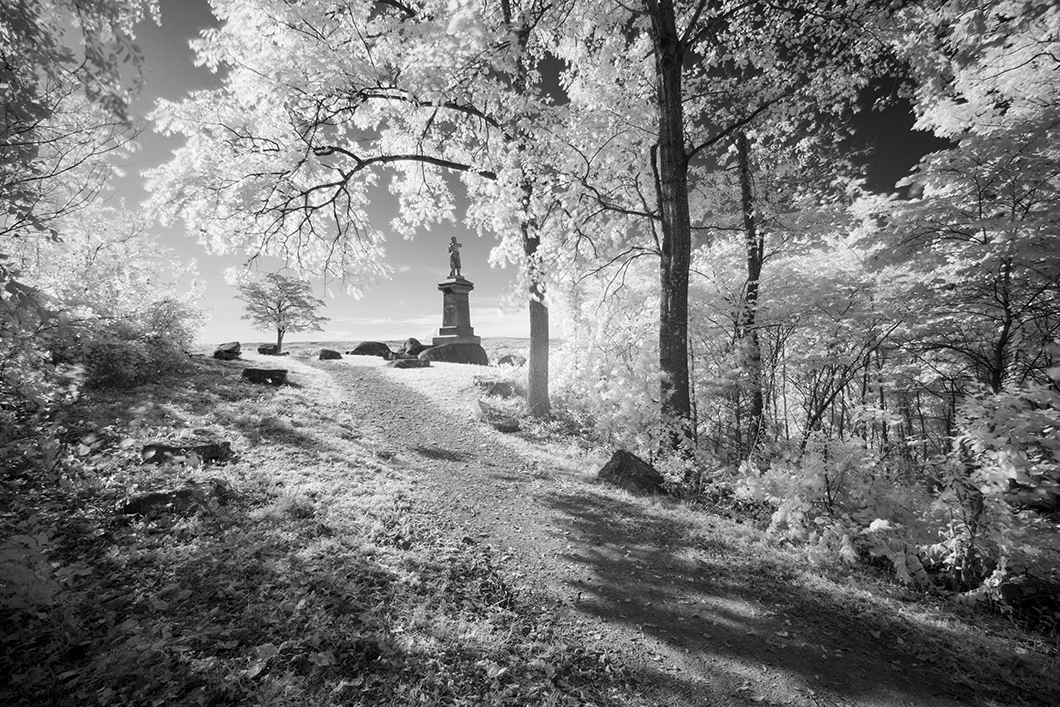Grandpa Gus

155th Pennsylvania Volunteers
It was nearly 50 years ago when I first made the journey went to Gettysburg. My hometown was an hour north and the two things I remember most vividly were Little Round Top and the pouring rain. There was hardly a soul to be seen as Tropical Storm Agnes drenched south central Pennsylvania in the early summer of 1972 with astounding totals of rain.
Undeterred, my dad and I tromped through knee deep puddles exploring the battlefield. But when he took me atop Little Round Top, my world was rocked for good. Not only were the boulders mesmerizing, but the stories of the gallant boys defending the mount in great haste against Alabamians and Texans hell bent on seizing the high ground, fascinated me. Even to a young, innocent 8-year-old boy, it was easy for me to see that I would have much rather been ordered to defend the heights than have been asked to storm those rocks.
Standing there in my raincoat and boots next to Union General Gouverneur Warren peering down upon the flooded Valley of Death, my interest in the Civil War was truly born. I estimate that I have visited Little Round Top some 15,000 times since that rainy summer day with dad. It was the only time I would ever go to Gettysburg with my dad, but that experience shared remains unforgettable. Dad died a number of years ago a Yankee to the bone, always believing “the Rebs” as he called them, were guilty of treason. It was black and white for him, seldom gray. Yet, though a Yankee and proud Korean War veteran, his lifelong unrepentant racial animosity soured me away. The vile rhetoric became difficult to forgive and forget. Neither do I do.
The Heisey clan rarely gathers these days, but late last summer a rare coming together happened which has changed my view of Little Round Top. In a discussion about the Heisey family’s ancestry with my aunt and cousin, they shared that my great, great grandfather, Augustus Henry Heisey was quite entrepreneurial after the Civil War. He launched Heisey Glass with a factory in eastern Ohio. Never did I know of my family’s ventures in to the decorative glass business that lasted well into the 20th Century. But, when my aunt brought out a vintage Heisey Glass catalog, there on page 8 was a picture of Grandpa Gus, taken in 1862 showing him decked in Union uniform with blue kepi slightly slanted with a boyish look about him.
When I read the short historical sketch written about him I about fell off the chair. Enlisting in 1862 with the 155th Pennsylvania Volunteers, he was mustered in near Pittsburgh. When he immigrated to America with his four brothers and a sister in 1842, he was just a newborn baby. His father was soon killed by cattle thieves who stole cash off his dead body, so Gus’s mom returned to Germany to take care of family business, dying of cholera upon her arrival back in Hanover, Germany. Young Gus grew up under his sister’s care and when he was 17, he took a job working for a glass manufacturer near Pittsburgh.
When I read that he enlisted in the 155th, I knew immediately that he would have been on Little Round Top as part of the 5th Corps under General George Sykes and in the same brigade as Joshua Lawrence Chamberlain. Grandpa Gus was rushed to the hill top after General Warren had raised the alarm of the dangerously exposed Union flank. The 155th monument, a soldier in French Zouave uniform, stands proudly atop a pedestal just feet from the Warren monument amidst the boulders strewn about the western facing slopes. There they encountered Texans trying to worm their way up the unforgiving terrain with Yankee bullets raining down upon them.

Little Round Top, GNMP
Photo by Chris Heisey
Lieutenant Heisey fought gallantly at Gettysburg, was wounded in the arm at the Wilderness a year later and arguably the pinnacle of his gallantry came when he helped lead a desperate charge at Petersburg where Brigadier General Chamberlain was badly wounded. Grandpa Gus was also wounded that day in the arm and that battlefield wound earned him commendation for courage on the battlefield.
At Appomattox Court House, it was Grandpa Gus and the 155th Pennsylvania that witnessed the passing of the armies and the formal surrender of Lee to Grant. Of the 148 original members of Co. C, Captain Heisey was one of only 25 who survived the three years of their enlistment.
Grandpa Gus Heisey died unexpectedly on February 13, 1922, at the age of 79, while at his vacation residence in Atlantic City, NJ, where he is buried with a Grand Army of the Republic marker neatly resting beside his humble grave.
Great family vignette. Thanks.
This is a great piece. Thanks for sharing.
–Chris Barry
Beautiful photo too !!
We need more of these–Grandaddy Mac & Grandpa Gus forever!!